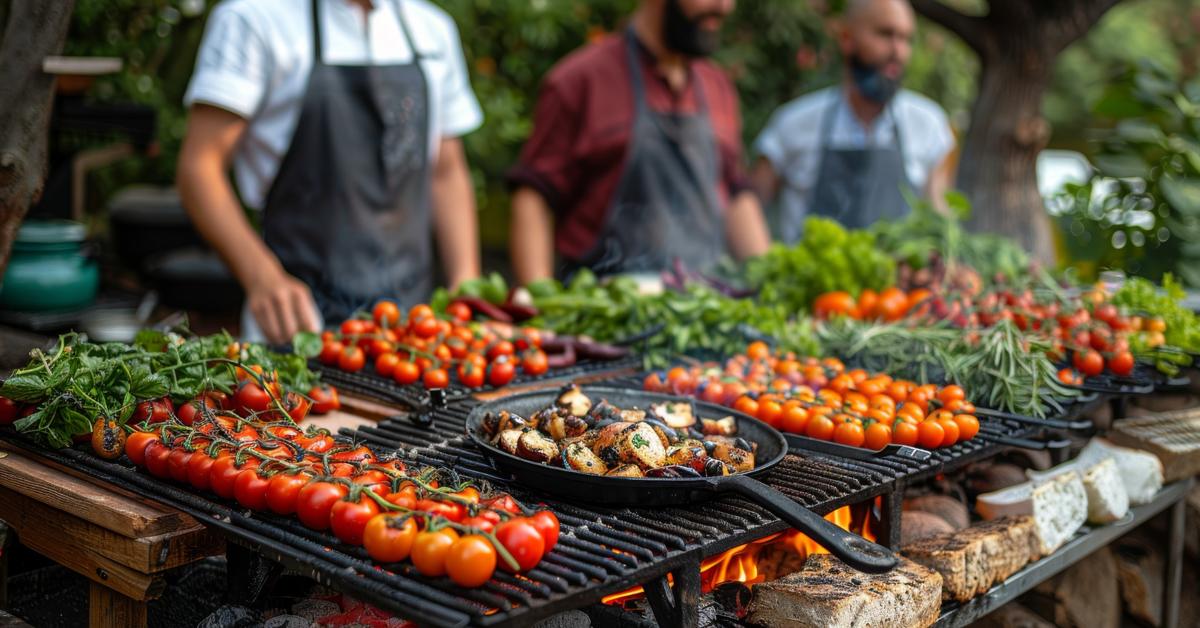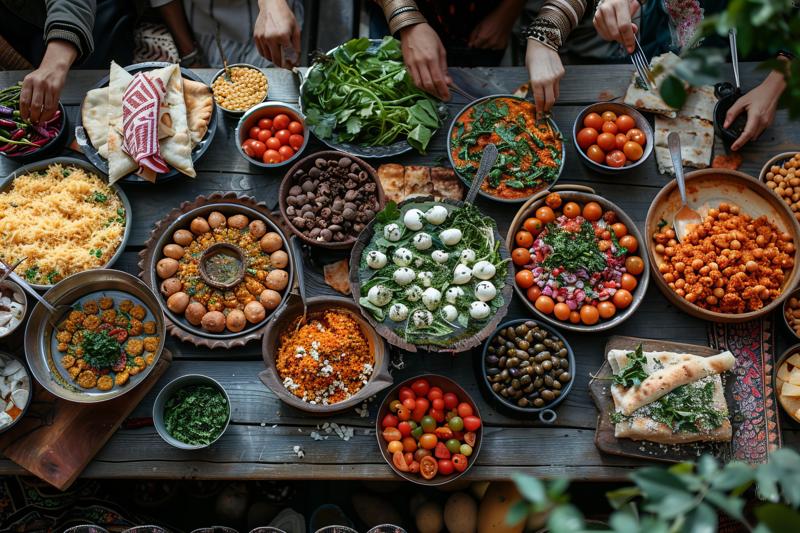
Food festivals have become cultural touchstones in communities across the country, bringing together local vendors, cuisine lovers, and tourists for unforgettable culinary experiences. With proper planning and the right tools, your food festival can become a standout event that delights attendees and supports local businesses. FreshTix makes it easy to manage both self-service and fully managed ticketing options, letting you focus on creating an amazing food experience.
1. Define Your Food Festival Vision
Start by clarifying exactly what you want your food festival to accomplish. Your vision will serve as the foundation for all your planning decisions and help you communicate your event's value to potential vendors, sponsors, and attendees.
-
Set specific goals for attendance numbers, revenue targets, and promotion of local food culture
-
Choose a compelling festival theme that resonates with your community (BBQ, international cuisine, vegan food, seafood, etc.)
-
Decide between ticketed admission or free entry with food purchases at vendor booths
Taking time to develop a clear vision now will save you countless hours later when making decisions about vendors, marketing, and programming. The most successful food festivals have a distinct identity that sets them apart from other events and creates memorable experiences for attendees.
2. Develop a Detailed Budget and Secure Funding
A comprehensive budget is your roadmap to financial success. Begin by listing all potential expenses, from the obvious costs like venue rental to easily overlooked items such as signage, staff T-shirts, and emergency supplies.
Many food festival organizers underestimate expenses or overestimate revenues in their initial planning. Be conservative in your projections and include a contingency fund of at least 10-15% for unexpected costs that inevitably arise.
-
Create a detailed spreadsheet covering venue rental, permits, insurance, marketing, staff, security, entertainment, and contingency funds
-
Research potential revenue streams beyond ticket sales, including vendor fees, sponsorships, merchandise, and beverage sales
-
Plan for cash flow timing, as many expenses come due before ticket revenue arrives
Vendor Recruitment Tips: Finding the right mix of food vendors is patriot of learning how to plan a food festival. It takes time and careful curation so start your recruitment process early and be selective about which vendors align with your festival's theme and quality standards.
-
Start recruiting food vendors 4-6 months before your event
-
Offer early-bird registration discounts to secure commitments
-
Provide clear guidelines on booth size, power requirements, and food safety regulations
3. Secure the Perfect Venue and Date
Your venue and timing can make or break your food festival. The ideal location balances accessibility, adequate space, and the right ambiance for your event theme.
Consider seasonality carefully when selecting your date. Spring and fall months typically offer the most comfortable outdoor temperatures in most regions, while summer events may require additional planning for heat management.
-
Consider weather patterns and choose dates that work for your local climate
-
Avoid competing with other major events in your area
-
Ensure your venue has adequate parking, accessibility features, and room for expansion
Look for venues with natural shade, easy access to restrooms, and space for seating areas where attendees can relax while enjoying their food. Remember that food festivals require significant infrastructure support for vendors, including electrical access, water supply, and waste management options.
4. Plan Your Ticketing Strategy
The right ticketing approach maximizes both attendance and revenue. Creating a thoughtful ticket structure allows you to appeal to different audience segments while managing your festival's economics.
Most successful food festivals offer multiple ticket options to accommodate different budgets and experiences. This might include general admission, VIP packages with special perks, and family bundles for those attending with children.
-
Create multiple ticket tiers to appeal to different attendees
-
Consider food ticket bundles that can be redeemed at vendor booths
-
Implement timed entry to manage crowd flow throughout the day
FreshTix Tip: Our mobile-friendly ticketing platform makes it easy to sell tickets online while providing real-time sales data. With FreshTix, you can customize your event page, offer multiple ticket types, and provide a seamless purchasing experience for your attendees.
5. Coordinate Entertainment and Activities
Food is the star, but entertainment enhances the experience and gives people reasons to stay longer. A well-planned entertainment schedule keeps energy high throughout your festival and creates additional value for attendees.
Consider entertainment options that complement your food theme rather than competing with it. Acoustic performers often work well during dining periods, while more energetic acts can draw crowds during natural lulls in eating.
-
Book local musicians, DJs, or performers that match your festival's vibe
-
Schedule cooking demonstrations from participating chefs
-
Organize food-related competitions like eating contests or amateur cook-offs
Well-timed entertainment helps control crowd flow, keeping attendees at your festival longer and increasing overall spending. Monitor the volume levels of performances to ensure they don't overwhelm conversations or create a chaotic atmosphere.
6. Marketing and Promotion
Strategic marketing builds excitement and drives ticket sales. The most effective food festival marketing highlights the unique experiences attendees can expect while creating a sense of community around your event.
Start your promotion early, but save your biggest pushes for the 6-8 weeks before your festival. This timing typically aligns with when most people make decisions about attending events.
-
Create an event website with integrated FreshTix ticketing
-
Develop a content calendar for social media featuring vendor spotlights, behind-the-scenes content, and ticket promotions
-
Partner with local media for coverage before and during the event
Food-focused content performs exceptionally well on social media. Share mouthwatering images from your vendors, create short videos about special dishes that will be featured, and encourage past attendees to share their favorite memories from previous festivals.
7. Logistics, Staffing, and Safety
Meticulous planning ensures smooth operations on festival day. Even the most exciting food lineup won't save your event if basic logistics like restrooms, trash management, and crowd flow aren't properly handled.
Your staffing plan should include clear roles and responsibilities for everyone involved, from volunteers checking IDs to troubleshooters who can quickly address problems that arise. Hold training sessions before the event to ensure everyone understands their duties.
-
Create detailed site maps showing vendor locations, entertainment areas, restrooms, and emergency exits
-
Develop staffing plans for volunteers, security, ticketing, and cleaning crews
-
Establish health and safety protocols, including handwashing stations and food safety inspections
Document your plans in an event manual that can be shared with key staff and updated for future events. This resource becomes increasingly valuable as your food festival grows year after year.
8. On-Site Operations and Day-Of Checklist
A well-organized event day leads to happy attendees and vendors. Your operations plan should cover everything from early morning setup to late-night breakdown, with clear timelines for each phase.
Arrive at your venue several hours before vendors to ensure the site is properly prepared. Have dedicated staff available to direct vendors to their assigned spaces and assist with any setup challenges they encounter.
-
Create a detailed timeline for setup, including vendor check-in procedures
-
Train ticketing staff on using the FreshTix mobile app for fast check-in
-
Conduct a pre-opening walkthrough to verify all areas are ready
FreshTix Feature: Our free mobile app makes checking in attendees fast and efficient. Color-coded scanning responses help identify different ticket types, and all devices stay perfectly synchronized throughout your event.
9. Post-Event Follow-Up
What happens after your festival is crucial for future success. The days immediately following your event provide a valuable window for gathering feedback while experiences are still fresh in everyone's minds.
Use the comprehensive data from your FreshTix dashboard to analyze which ticket types sold best, when purchases peaked, and how successful your promotional codes were. This information will be invaluable for planning your next festival.
-
Distribute surveys to attendees, vendors, and staff within 48 hours
-
Review comprehensive sales and attendance reports from your FreshTix dashboard
-
Schedule a debrief meeting with your core team to discuss successes and areas for improvement
Collecting and analyzing this data helps you continually improve your food festival year after year. The most successful events evolve based on real feedback and metrics rather than assumptions.
Why FreshTix is the Ideal Partner for Your Food Festival
FreshTix provides everything food festival organizers need for successful ticketing. Our platform was built with the specific challenges of food events in mind, from managing multiple vendor registrations to handling complex ticket packages.
We understand that food festivals operate on tight margins, which is why our transparent pricing model ensures you keep more of your revenue. Our seamless mobile check-in system keeps lines moving quickly, so attendees spend less time waiting and more time enjoying your event.
-
Simple, mobile-friendly purchasing experience for attendees
-
Customizable event pages that showcase your festival's unique appeal
-
Multiple ticket types with flexible pricing options
-
Real-time sales tracking and attendee reports
While you are figuring out how to plan a food festival, keep our platform in mind. It is specifically designed to handle the unique needs of food festivals, with features that streamline operations and maximize revenue.
FAQs About Planning a Food Festival
1. How far in advance should I start planning a food festival?
Start planning at least 8-12 months before your target date. This gives you adequate time to secure permits, book vendors, develop marketing materials, and build excitement. Key vendors and preferred venues often book up quickly, so early planning gives you more options.
2. What permits do I need for a food festival?
Common permits include food service permits, temporary event permits, alcohol licenses (if applicable), fire department approvals, and health department certifications. Requirements vary by location, so contact your local government offices early in the planning process. FreshTix can help you track permit deadlines through our event management tools.
3. How do I price food festival tickets?
Research similar events in your area to establish a baseline. Consider your costs and revenue goals, then create a tiered pricing structure that might include general admission, VIP experiences, and family packages. FreshTix makes it easy to offer early bird pricing and promotional codes to drive advance sales.
4. Can I use FreshTix for both ticketing and vendor registration?
Yes! FreshTix can manage both attendee ticketing and vendor registration through our flexible platform. Create specialized registration options for vendors with different booth sizes or needs, collect their information, and process payments all in one place.
Ready to Plan Your Food Festival?
Get Started Free with FreshTix today and discover why event organizers trust our platform for festivals of all sizes. No credit card required to try our ticketing software.
23 Summer Event Ideas for the 2025 Season How to Beat Ticket Scalpers: A Guide for Event Planners


